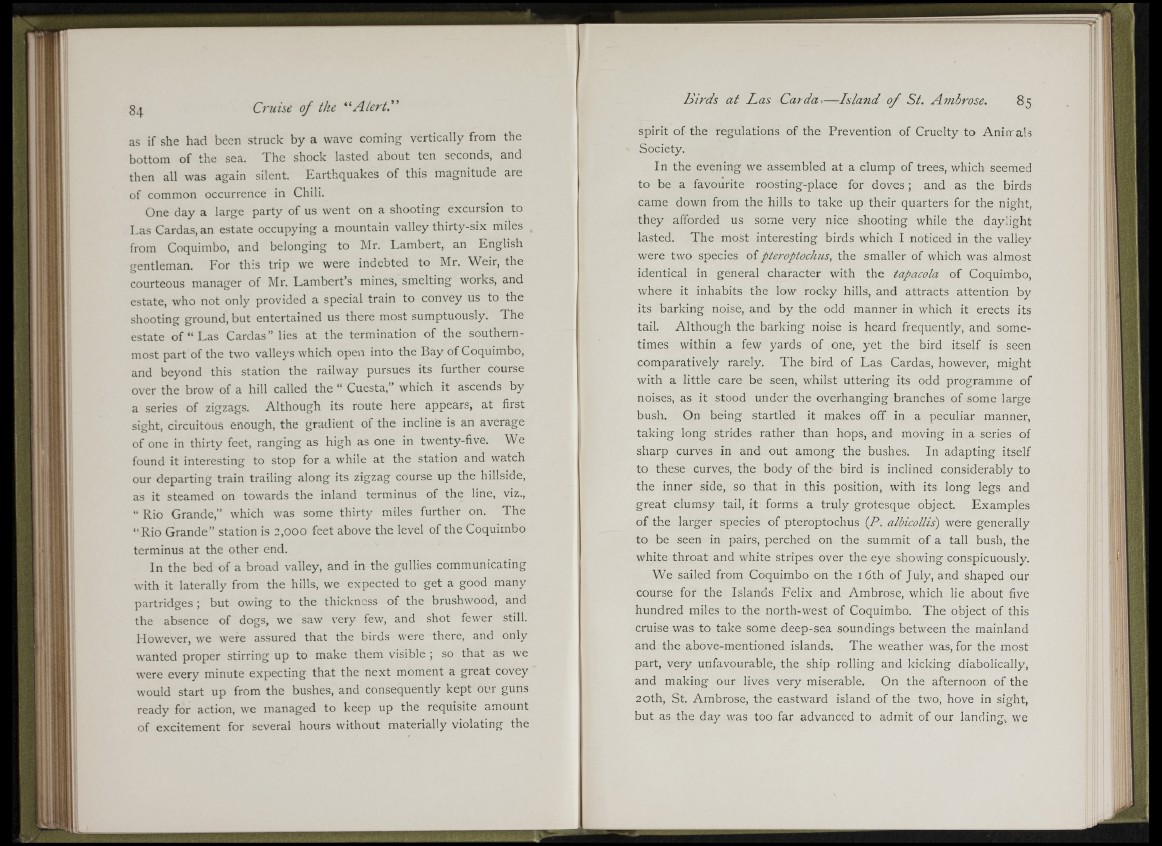
.i.e
as if she had been struck by a wave coming vertically from the
bottom of the sea. The shock lasted about ten seconds, and
then all was again silent. Earthquakes of this magnitude are
of common occurrence in Chili.
One day a large party of us went on a shooting excursion to
I.as Cardas, an estate occupying a mountain valley thirty-six miles
from Coquimbo, and belonging to Mr. Lambert, an English
gentleman. For this trip we were indebted to Mr. Weir, the
courteous manager of Mr. Lambert’s mines, smelting works, and
estate, who not only provided a special train to convey us to the
shooting ground, but entertained us there most sumptuously. The
estate of “ Las Cardas” lies at the termination of the southernmost
part of the two valleys which open into the Bay of Coquimbo,
and beyond this station the railway pursues its further course
over the brow of a hill called the “ Cuesta,” which it ascends by
a series of zigzags. Although its route here appears, at first
sight, circuitous enough, the gradient of the incline is an average
of one in thirty feet, ranging as high as one in twenty-five. We
found it interesting to stop for a while at the station and watch
our departing train trailing along its zigzag course up the hillside,
as it steamed on towards the inland terminus of the line, viz.,
“ Rio Grande,” which was some thirty miles further on. The
“ Rio Grande” station is 2,000 feet above the level of the Coquimbo
terminus at the other end.
In the bed of a broad valley, and in the gullies communicating
with it laterally from the hills, we expected to get a good many
partridges ; but owing to the thickness of the brushwood, and
the absence of dogs, we saw very few, and shot fewer still.
However, we were assured that the birds were there, and only
wanted proper stirring up to make them visible ; so that as we
were every minute expecting that the next moment a great covey
would start up from the bushes, and consequently kept our guns
ready for action, we managed to keep up the requisite amount
of excitem.ent for several hours without materially violating the
Birds at Las Car da ^—Island of St. Ambrose. 85
spirit of the regulations of the Prevention of Cruelty to Aniirals
Society.
In the evening we assembled at a clump of trees, which seemed
to be a favourite roosting-place for doves ; and as the birds
came down from the hills to take up their quarters for the night,
they afforded us some very nice shooting while the daylight
lasted. The most interesting birds which I noticed in the valley
were two species of pteroptochus, the smaller of which was almost
identical in general character with the tapacola of Coquimbo,
where it inhabits the low rocky hills, and attracts attention by
its barking noise, and by the odd manner in which it erects its
tail. Although the barking noise is heard frequently, and sometimes
within a few yards of one, yet the bird itself is seen
comparatively rarely. The bird of Las Cardas, however, might
with a little care be seen, whilst uttering its odd programme of
noises, as it stood under the overhanging branches of some large
bush. On being startled it makes off in a peculiar manner,
taking long strides rather than hops, and moving in a scries of
sharp curves in and out among the bushes. In adapting itself
to these curves, the body of the bird is inclined considerably to
the inner side, so that in this position, with its long legs and
great clumsy tail, it forms a truly grotesque object. Examples
of the larger species of pteroptoclius {P. albicollis) were generally
to be seen in pairs, perched on the summit of a tall bush, the
white throat and white stripes over the eye showing conspicuously.
We sailed from Coquimbo on the i6th of July, and shaped our
course for the Islands Felix and Ambrose, which lie about five
hundred miles to the north-west of Coquimbo. The object of this
cruise was to take some deep-sea soundings between the mainland
and the above-mentioned islands. The weather was, for the most
part, very unfavourable, the ship rolling and kicking diabolically,
and making our lives very miserable. On the afternoon of the
20th, St. Ambrose, the eastward island of the two, hove in sight,
but as the day was too far advanced to admit of our landing, we
■
!!; ' C